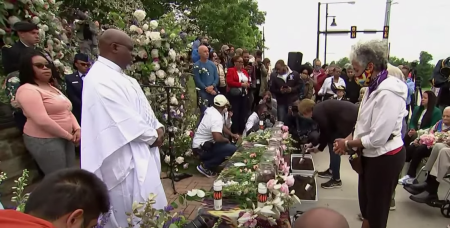Hundreds gather at Tulsa church’s prayer wall for 100th anniversary of race massacre

Hundreds attended an interfaith service at a historic church in Tulsa, Oklahoma, to mark the 100th anniversary of one of the worst race massacres in United States history.
Held Monday at Vernon African Methodist Episcopal Church in Tulsa’s Greenwood neighborhood, the event featured prominent national and local African-American faith leaders like Rev. Jesse Jackson and Rev. William Barber.
“You can kill the people but you cannot kill the voice of the blood,” stated Barber at the event, as reported by The Associated Press, adding that he was “humbled even to stand on this holy ground.”
Members of Congress were in attendance, including Rep. Barbara Lee, D-Calif., Rep. Lisa Blunt Rochester, D-Del. and Sen. Chris Coons, D-Del.
In addition to the interfaith service, President Joe Biden also gave a speech at the Greenwood Cultural Center in Tulsa on Tuesday.
“You know, there’s a verse in 1 Corinthians that says, ‘For now, we see in a mirror dimly, but then, face to face, now I know in part, then I shall know fully,’” said Biden.
“For much too long, the history of what took place here was told in silence, cloaked in darkness. But just because history is silent, it doesn’t mean that it did not take place. And while darkness can hide much, it erases nothing.”
On May 31, 1921, a white mob violently attacked the black Tulsa neighborhood of Greenwood, which included a major business district commonly known as Black Wall Street.
For approximately 18 hours, clashes occurred in Greenwood, with over 1,200 houses destroyed and an official death toll of 36 people, predominantly African-American.
History.com dubbed the Tulsa Race Massacre as “one of the deadliest riots in U.S. history, behind only the New York Draft Riots of 1863, which killed at least 119 people.”
“In the years to come, as Black Tulsans worked to rebuild their ruined homes and businesses, segregation in the city only increased, and Oklahoma’s newly established branch of the KKK grew in strength,” noted the site.
“A 2001 state commission examination of events was able to confirm 36 dead, 26 Black and 10 white. However, historians estimate the death toll may have been as high as 300.”
Last year, a group of people, including a predominantly African-American church and a 105-year-old survivor of the massacre, sued Tulsa for reparations over the violent tragedy.
“Defendants’ unlawful acts and omissions in the years and decades following the Massacre blighted the Greenwood neighborhood, endangering the health and safety of the Greenwood community,” the lawsuit stated.
“Defendants’ interference with investment in the Greenwood and North Tulsa community and neighborhood, which began after the Massacre, continues to this day.”
Previous lawsuits seeking compensation for the 1921 riot have failed, including a federal suit in 2003 that was dismissed due to a statute of limitations.





















